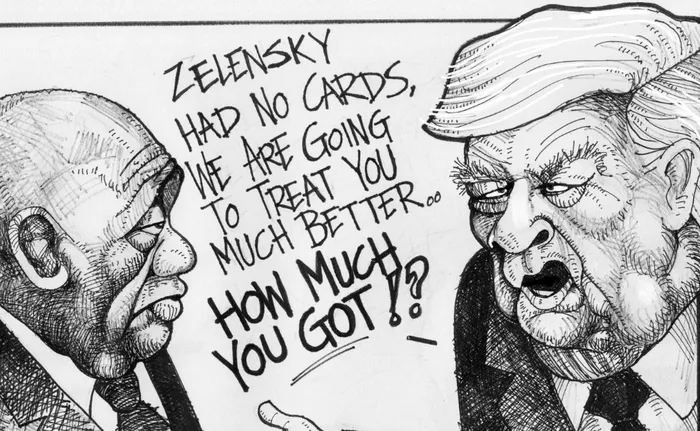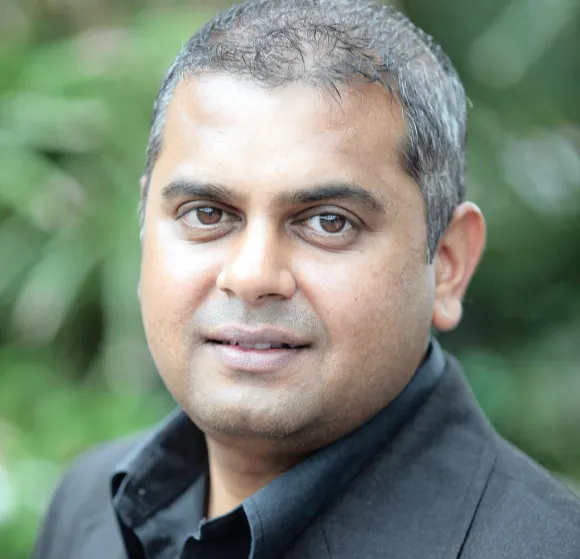
The day Ramaphosa and Trump met.
Image: Nanda Soobben
THABO Mbeki endured eight days in September, a turbulent period in 2008 that led to his ousting as President of the Republic. With Jacob Zuma, it was the so-called nine wasted years, a presidency characterised by state capture and economic decline. For President Cyril Ramaphosa it was a case of ten minutes of shame, and it happened on the world stage.
The meeting between Ramaphosa and US President Donald Trump started well. It should have been a sign. When it is too good to be true, it probably isn’t.
Ramaphosa must have been nervous but, for the first 20 minutes, he came across as relaxed, in control and, at times, even jovial. He had clearly learnt from the ill-fated encounter Volodymyr Zelenskyy had with Trump. In contrast to the Ukraine president, Ramaphosa, went out of his way to thank Trump and praise him. And then, about 20 minutes into the meeting, Trump asked for the lights to be dimmed. What followed was a video of Julius Malema addressing supporters.
In a voice that is now familiar to most South Africans, he chanted “Kill the Boer, kill the farmer” and spoke about expropriating land of white farmers without compensation.
The mood in the room changed. The chant was now exposed to a global audience. There was no context and, as a result, it came across as crude. Inciteful. Shameful. Ramaphosa wiped his face. He was probably hot in his suit and tie. There were also bright camera lights, and the room was packed with people. But those who study body language claim it could also be a sign of anxiety – perhaps a desire to wipe away a problem or stress.
But this problem was not going away. The chant was first uttered by Peter Mokaba, a former president of the ANC Youth League. He did so while addressing a rally following the murder of Chris Hani by right-wing whites. The chant has always been contentious. But the Equality Court found it did not constitute hate speech and should be protected as freedom of speech.
Afrikaner lobby group AfriForum did approach the Constitutional Court to appeal the matter, but the court found the application had no reasonable prospect of success. As a result, Malema cannot be arrested for singing the song, as suggested by Trump. Ramaphosa did point out that official government policy was completely against what Malema said. But what Ramaphosa didn’t say was that neither he nor others in the ANC have done enough to distance themselves from the chant.
After the voice of Julius Malema, came another voice well known to most South Africans – Jacob Zuma. These days, he is the leader of the uMkhonto weSizwe Party. But not too long ago he was the leader of the ANC and President of the Republic. In the recordings played, he too had a go at white farmers.
When the video ended, US Vice President JD Vance handed his president a thick stack of pages that reportedly depicted the brutality of the attacks on white farmers.
The DA’s John Steenhuisen, in his role as agriculture minister in Ramaphosa’s executive, put up a spirited defence: “They are both leaders of opposition minority parties,” he said.
“The reason my party, the DA, chose to join hands with Mr Ramaphosa’s party was precisely to keep those people out of power. We cannot have these people sitting in the Union Buildings making decisions.”
But by then the world had realised that not all was well in South Africa. At best we are a violent bunch. At worst we are a racist nation. In those ten minutes, South Africa had been exposed. In his own unique rhetoric, Trump summed it up: “There are many bad things happening in many countries, but this is very bad – very, very bad!”
It didn’t matter whether Trump had the full facts or not. He had enough to paint a picture, and it wasn’t a rosy one. Anyone wanting to visit the country or invest in it would have been forced to reconsider. Trump then invited three men he knew and clearly admired to say a few words.
They were businessman Johann Rupert and golfers Ernie Els and Retief Goosen. It was ironic that it took an American president to invite the men to speak because it was a courtesy their own government had not offered them – certainly not in recent years and not in public. Yet these were no ordinary men. Rupert is a celebrated businessman who is one of the richest people in South Africa. Els and Goosen are both masters at the game of golf.
The second irony was that while the voices of Malema and Zuma have become so well known, the voices of Rupert, Els and Goosen have rarely been heard in South Africa. Yet, they are the kind of people whose opinion should be sought and whose success we should emulate. It speaks to the society we have become. It is one where those who seek to antagonise and break apart become popular, while those who seek to build are ignored. It is a society that places credibility on those who shout the loudest and avoids those with integrity.
In this society, mediocrity is celebrated and merit shunned. It is no wonder then that South Africa finds itself in an economic mess. The economy is barely growing and certainly not at levels that will create meaningful jobs. For more than a decade and half the country has been sliding into economic decline. The projections for the coming year are dismal. Economic growth is projected at 1.4% with slight increases in 2026 and 2027 but nowhere near enough to create meaningful jobs for a growing population.
The solution to the problem emerged in the White House get together.
“We need more foreign investment in our country,” urged Cosatu president Zingiswa Losi.
"If the South African economy does not grow, the culture of lawlessness and dependency will grow,” said Rupert, mirroring the sentiments of organised labour.
It means that if our president wants to change the trajectory of economic growth, it cannot be more of the same. There are a few realities that must be acknowledged. No one will invest in a place where they must give away a chunk of a business they have nurtured. No one will invest in a country where they can’t hire the best talent for the job. No one will put their money where the government can take away their land for nil compensation. And no one will invest in a place they don’t feel safe in.
If the South African government is to change the fortunes of this country, it needs to ditch broad based black economic empowerment. People need to be hired on the basis on merit and not skin colour. Land expropriation without compensation needs to be reconsidered. Above all, South Africa needs to make investors feel safe. But the clock is ticking.
This Government of National Unity is at the end of their first year of a five-year term in office.
As Steenhuisen warned: “This government, working together, needs the support of our allies around the world, to grow our economy and shut the door forever on that rabble.”
That “rabble” is the EFF and MK. Combined they got one out of every four votes cast in the last general elections. If this government cannot improve the fortunes of ordinary South Africans, support for the so-called rabble will rise and Constitutional Democracy may be done for. Then, what Donald Trump thinks South Africa is, will become our reality.10, 9, 8, 7, 6 5, 4 …..

Aakash Bramdeo
Image: File
Aakash Bramdeo is the eNCA politics and business editor. His views do not represent those of the POST or IOL. This opinion was first published by enca.com
Related Topics: